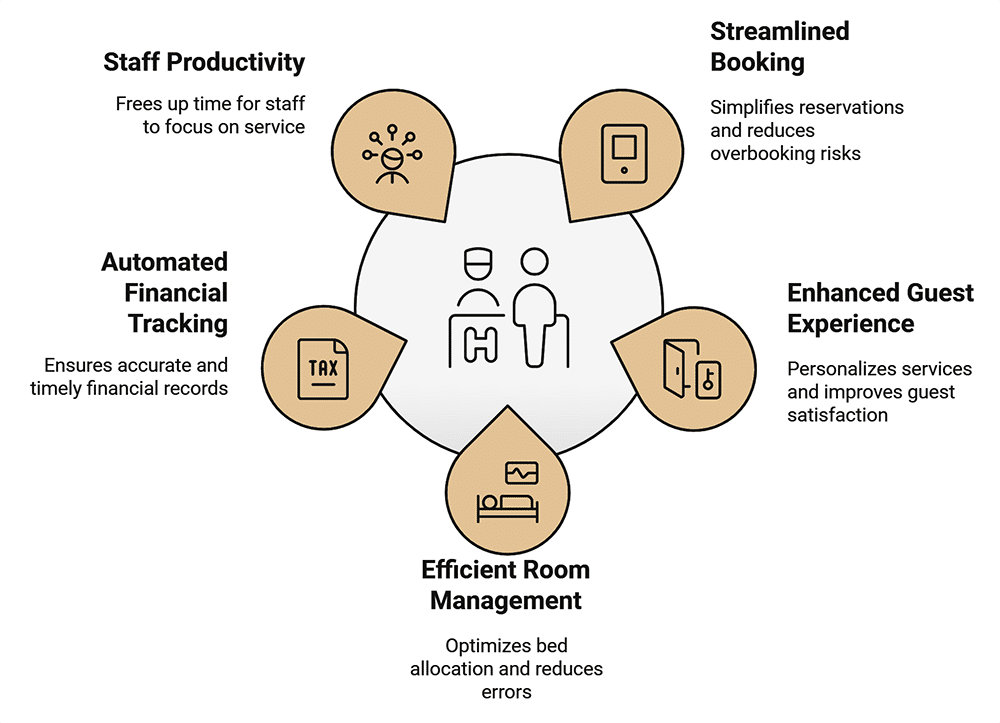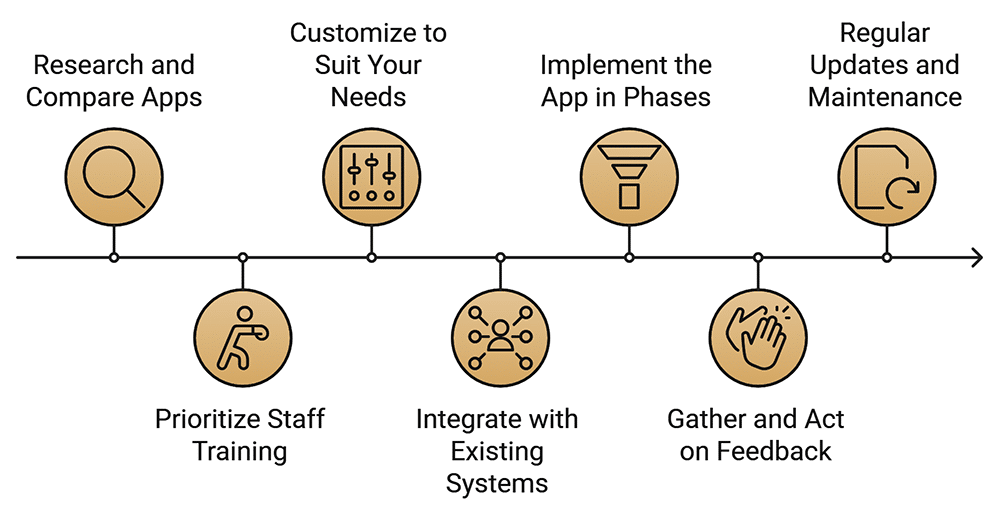A hostel management app is a digital software solution, which can be used to manage various aspects of a hostel business. This can include managing bookings, daily tasks and interactions with customers.
Hostel management apps can enhance the guest experience in a number of key ways and can make it easier to manage day-to-day operations. The app can also centralize important information and enhance hostel security.
In this article, you will learn how hostel management apps work and discover the most important features to look out for. You will also find useful tips for implementation and a breakdown of the key benefits.
Table of Contents:
- What is a Hostel Management App?
- Why Are Hostel Management Apps Important?
- 5 Key Benefits of Using a Hostel Management App
- 6 Essential Features to Look for in a Hostel Management App
- 7 Tips for Implementing a Hostel Management App
- Do’s and Don’ts of Using a Hostel Management App
- What is a Hostel? Exploring Budget-Friendly Accommodation
- Hostel Management Systems: Streamlining Operations
What is a Hostel Management App?
A hostel management app is a digital tool that allows important information to be centralized and core operations to be managed. This includes managing reservations, check-ins, check-outs, and guest communications.
Hostel management systems are similar to a hotel management system, but are tailored to the needs of accommodation businesses targeting backpackers and similar travelers. They allow managers to oversee day-to-day tasks.
Common features include automation tools, real-time insight into bookings and availability, and integrated payment systems. A hostel management app can also be invaluable to those in the hostel industry, providing a means of accessing important information about different aspects of the business from a single location.
Why Are Hostel Management Apps Important?
Hostel management apps are important because they can be used to optimize the guest experience. This can be achieved by improving the efficiency of processes and the productivity of staff, and by boosting hostel security.
The centralization of important information makes it quicker and easier for hostel staff to access it. A hostel management app can also serve as a form of hotel reservation software, facilitating bookings.
Automation tools within the software can be used to improve the speed of tasks and reduce human error. Reducing mistakes and avoiding delays can lead to a smoother and more pleasant guest experience.
5 Key Benefits of Using a Hostel Management App
In the sections that follow, you can learn about five of the most significant benefits of using hostel management apps.
1. Streamlining the Booking Process
A hostel management app can streamline the booking process for the hostel and for guests. The software can allow guests to book a place in the hostel and can automate post-booking communication.
Streamlined booking is important because you want to make a reservation as quickly and easily as possible. Reducing friction makes it less likely that a potential guest will back out of the process.
Real-time availability information centralized by the app and used to power the hostel booking system also reduces the risk of overbooking. This can eliminate a lot of frustration for guests and staff.
2. An Enhanced Guest Experience
Using a hostel management app can help to significantly boost the guest experience. Features like in-app communication, contactless check-ins and digital keycards can all provide clear advantages.
One of the reasons a hostel manager app is so important for the guest experience is that it can facilitate personalization. Customer data makes it easier to tailor offerings to individuals.
Positive guest experiences can then lead to good reviews and benefits to your hostel’s reputation.
3. More Efficient Room and Bed Management
A high-quality hostel management app can make it easier to manage room and bed assignments. These tasks are aided greatly by the centralized, real-time availability of information.
This is important because hostels have unique challenges surrounding the shared nature of guest spaces and the allocation of beds. An app allows all relevant information to be accessed and updated easily.
As a result, guests can be allocated a bed quickly and easily, while staff can avoid errors.
4. Automating Financial Tracking
Using a hostel management app, it is possible to track financial transactions. Additionally, the best apps also provide tools for processing payments and creating invoices.
Automating the tracking of financial information can free up employees to focus on other matters. As a bonus, automation can help to eliminate human error and avoid disruption caused by miscalculations.
Many management apps used in the hostel industry can also integrate with external payment systems, ensuring data is updated in real time. Some apps can create financial reports and integrate with compliance software too.
5. Enhancing the Productivity of Staff
The automation tools within hostel management apps can quickly and reliable carry out tasks that would otherwise require human involvement. This can then have a huge knock-on effect on staff productivity.
Productivity is important because hostels need to make sure they are getting value for the money they pay employees. Automation can assist with some tasks and complete others independently, freeing up staff time.
When the workforce is more productive, it can spend more time focusing on providing great service to guests.
6 Essential Features to Look for in a Hostel Management App
When exploring the different hostel management app options on the market, the following features are crucial.
Video: Know the Features of Hostel Management System| Hostel Management System| Hostel Management Tool
1. A User-Friendly Interface
Your chosen hostel management app should have a user-friendly interface. This means the app should be easy to navigate and understand, and this ease should apply to everyone who uses it.
The interface is important because a clean, intuitive layout can prevent a lot of issues related to users struggling to find what they are looking for. This, in turn, can reduce training time and productivity costs.
Guests can also benefit from a great interface, especially when it comes to booking or checking in and out.
2. Multi-Platform Integration
The hostel management app you select should provide support for multi-platform integration. This may mean integration with booking engines, payment systems, online travel agencies, accounting apps and more.
Integration is important because modern businesses want interconnected solutions. When data can be shared between apps, errors can be reduced and unnecessary data duplication can be eradicated.
Multi-platform integration also potentially allows you to reach a wider audience and attract more guests.
3. Automated Communication Tools
Communication is a vital part of the hostel industry and a good hostel management app can automate some of this. For instance, pre-arrival emails, confirmation emails and instructions for check-ins can be sent automatically.
Automation is important for providing quality communication at the right moment, such as immediately after a guest makes a booking. It also reduces the workload of your own team.
In an age where many customers expect swift or even instant responses, hostel management apps with AI features can be highly beneficial, providing rapid responses to common questions or queries.
4. Reporting and Analytics
The best hostel management apps will offer reporting and analytics features. These tools allow you to easily access the most vital data points quickly and provides a level of analysis, so data can be understood.
This is important because hostels need to make evidence-based decisions. Such decisions are made easier if useful data is readily available and if actionable insights can be easily extracted from the information.
Focus on apps that support reports for occupancy, average length of stay, revenue per available bed, and other KPIs.
5. Mobile Accessibility
A mobile accessible hostel management app can be an invaluable tool in the modern age. An app with mobile functionality will allow you to access core elements of the app from a smartphone or tablet device.
Mobile accessibility has emerged as an important differentiator for software solutions because users want continuous access to tools. Mobile accessibility can make it easier to manage aspects of a hostel remotely.
An app with mobile accessibility can be especially valuable in small hostels, where staff may be more stretched.
6. Guest Management Features
Best-in-class hostel management apps will provide useful features for managing guests. This may include options to create guest profiles, access guest preferences, and manage guest payments and documentation.
Guest management features are crucial for optimizing the experience of staying in your hostel. This is especially true when it comes to delivering the personalization elements that guests crave.
Try to find a solution that automatically collects guest information, but also allows staff to add notes. This makes it easier to collect specific details that can be used to take the guest experience to the next level.
7 Tips for Implementing a Hostel Management App
In the sections that follow, you can access seven useful tips for hostel management app implementation.
1. Research and Compare Apps
It is important to take the time to conduct research and compare the features of different hostel management apps. You need to make sure you select a solution that offers everything you need.
You should consider pricing models, the overall cost of acquiring and using the software and the level of support available. Try to focus on a solution that is specifically designed for hostels.
2. Prioritize Staff Training
Once you acquire your chosen hostel management app, you need to make sure hostel staff are able to utilize it fully. This typically requires investment in staff training activities.
Ensure everyone who is going to use the software knows how to do so properly. At least some of the staff on-site should have advanced knowledge of the app for troubleshooting and support purposes.
3. Customize to Suit Your Needs
The best hostel management apps provide options for customization, so take the time to engage with these options. This allows you to modify aspects of the app to match your business’s unique needs and overall branding.
You may be able to customize the user interface and rules around hostel pricing. Set the software up so it reflects your business and so any automated communication feels authentic to your brand’s voice.
4. Integrate with Existing Systems
Your hostel management app should include integration options, and it is essential to use them. Make sure your existing systems are integrated so data can be shared and updated in real-time.
Examples of systems to integrate with include your CRM software, your payment gateway and your booking engine. Integration reduces the amount of data that needs to be updated manually and can avoid errors and data duplication.
Explore the Features Of An Automated Hostel Management System| Hostel Management Software
5. Implement the App in Phases
In many cases, a phased approach to implementing your hostel management app can be beneficial. This means you may start by using certain core features and gradually expand from there.
This approach helps to ensure staff know how to use specific features before teaching them new ones. It also gives you time to migrate operations away from existing software and allows you to address teething issues more easily.
6. Gather and Act on Feedback
After you have put your hostel management app into action, you should try to gather feedback and use this to inform decision-making. Feedback can be sought from employees and from hostel guests.
Using the feedback you gather, you can make adjustments to the way the software is set up or can make decisions around integration with other tools. Focus on ease of use, efficiency and reliability.
7. Regular Updates and Maintenance
The best hostel management apps will receive regular updates, fixing bugs, adding new features and enhancing data security. It is essential to keep your software up-to-date at all times by installing the latest versions.
You should also make sure you are carrying out any necessary maintenance tasks too. This may include backing up data stored in the app, maintaining databases and promptly fixing any issues that arise with the software.
Do’s and Don’ts of Using a Hostel Management App
Below, you can learn the things you should and should not do when using a hostel management app.
Do’s
- Software Updates: A hostel management app should be frequently updated to access new features and bug fixes.
- Staff Training: Take the time to educate staff on how to use the software effectively.
- Data-Driven Decisions: Use reporting and analytics features to gain insights and make evidence-based decisions.
- Customization: Set up software features and tailor the user interface to suit the needs of your business.
- Guest Communication: Utilize built-in communication tools to interact with guests and provide useful information.
Don’ts
- Neglecting Data Backups: Always ensure your data is continually backed up to avoid business disruption.
- Disregarding Feedback: Pay attention to what staff and customers are telling you about the app and act on feedback.
- Sharing Login Credentials: Setting up individual user accounts makes it easier to set specific permissions.
- Using Static Pricing: Your hostel management app can help you implement dynamic pricing to maximize earnings.
- Relying Too Much on Technology: Your hostel management app is a useful tool, but you must retain the human touch.
What is a Hostel? Exploring Budget-Friendly Accommodation
A hostel can be broadly defined as a budget-friendly form of accommodation, which uses shared quarters for guests. Typically, guests will be allocated beds rather than private rooms, and this setup promotes social interactions. Hostels are popular among backpackers, gap year travelers, and those who operate on a strict budget.
In the “What is a Hostel? A Full Hostel Guide for Hoteliers” article, you can access a more comprehensive definition, explore the key features, and learn how the hostel industry differs from the hotel industry.
Hostel Management Systems: Streamlining Operations
Hostel management systems are invaluable tools for overseeing day-to-day operations within the hostel industry. They include tools for reservations, inventory management and booking systems. A hostel management app can help to improve efficiency, productivity and accuracy, while enhancing the guest experience.
In the “Hostel Management Systems: Everything You Need to Know” article, you will find a complete breakdown of these systems, including the primary uses, the main features and pricing information.
Did You Like This Article About Hostel Management App?
You might also be interested in the following articles:
- Hotel Management Software: What Are the Benefits for Hotels?
- 5 Hotel Management Software Solutions Every Hotel Needs
- Hotel App: Optimize Your Guest Communication, Experience & Revenue
- RMS System: An Overview of the Most Important Features
- Which Software Integration Should a PMS Have?
A hostel management app is a useful tool for managing daily operations, communicating with guests, and providing reservation options. You can use your app to make data-driven decisions and to improve operational efficiency. Selecting the right app is vital, however, as you want to achieve integration with existing software solutions.
More Tips to Grow Your Business
Revfine.com is a knowledge platform for the hospitality & travel industry. Professionals use our insights, strategies and actionable tips to get inspired, optimise revenue, innovate processes and improve customer experience. You can find all hotel & hospitality tips in the categories Revenue Management, Marketing & Distribution, Hotel Operations, Staffing & Career, Technology and Software.This article is written by:
Hi, I am Martijn Barten, founder of Revfine.com. With 20 years of experience in the hospitality industry, I specialize in optimizing revenue by combining revenue management with marketing strategies. I have successfully developed, implemented, and managed revenue management and marketing strategies for individual properties and multi-property portfolios.










Leave A Comment